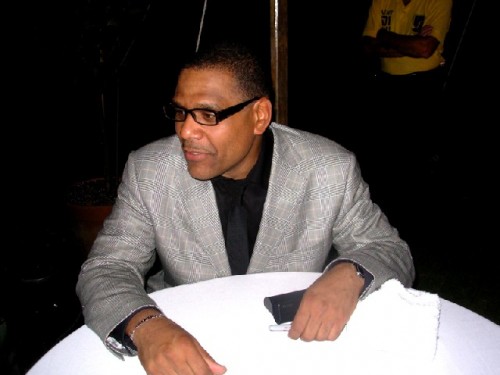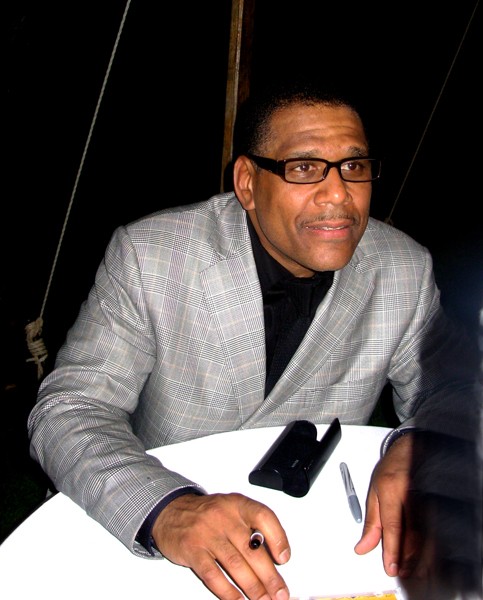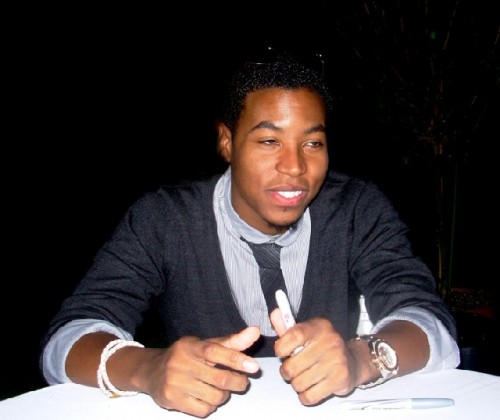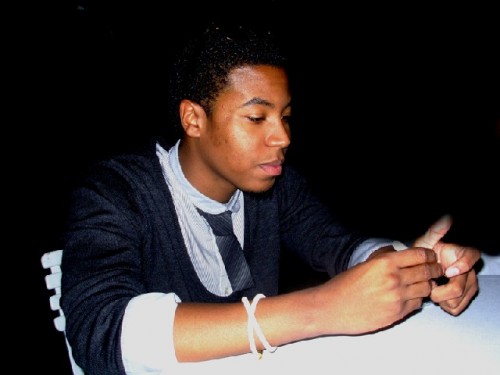Tanglewood Jazz Festival 2008 Donal Fox and Christian Scott
Scarlatti Jazz Suite Project
By: Charles Giuliano - Sep 02, 2008
The four time Grammy winner, the singer, Dianne Reeves, one of the sparse, A list headliners in the cautiously underbooked Tanglewood Jazz Festival 2008, was featured on Saturday night of Labor Day Weekend. Her star power was sufficient to sell out Ozawa Hall and produce a strong turnout on the lawn on a perfect, end of summer evening.
With the exception of the magnificent closing performance by Terence Blanchard, his quintet and the 34 piece Tanglewood Jazz Orchestra, on Sunday night, the Festival, overall, seemed to lack ambition and focus on emerging artists and conservative programming. There seemed to be an attempt on the part of the organizers to stay within the overall mandate of the Tanglewood tradition. To find artists and programs that fit the profile. In particular, there was a conspicuous avoidance of the cutting edge and avant-garde. A common denominator of all of the artists presented during the annual weekend of jazz was superb musicianship. In that sense, all of the performers richly deserved to appear on the hallowed grounds of Tanglewood.
But it also begs the question, man, of where was the funk? A case in point was the opening act on Saturday night, Donal Fox, and his quintet: Christian Scott, trumpet, Warren Wolff, vibraphone, John Lockwood, double bass, and Terri Lyne Carrington, drums. They performed what may be described as chamber jazz with his Scarlatti Jazz Suite Project.
The music which Fox and his group performed was tasteful and cerebral to a fault. He writes variations on Baroque music from a range of masters and influences conflated with sources in contemporary jazz and soul from Monk and Trane to James Brown and Curtis Mayfield. It is indeed a heady and tantalizing blend of elements with catchy time signatures and many lyrical, compelling passages. Often it seemed like the sound track of a romantic French film.
The program notes state that he was recently awarded the American Academy of Arts and Letters Academy Award in Music. There is a quote from critic Gary Giddens that "Donal Fox is a remarkable pianist who has positioned himself on the cutting edge of jazz by incorporating classical techniques and melodies. The pinnacle of his achievement is found in his blending of Monk and Bach, in his vivid reimaginings of the Modern Jazz Quartet, and in such dazzling original works as 'Scarlatti Jazz Suite' and 'Italian Concerto Blues.' Donal is one of the handful of musicians who embody the promise of jazz's future.' " Perhaps.
For me the experience of hearing Fox and his well disciplined quintet, reading those pristine arrangements, was more about thinking than feeling. In the balance of the equation there seemed more of the Classical than the Dionysian. Of course this is one of the most ancient debates in the arts and has contrasted many forms through the centuries. It is just taking a more specific dichotomy here in an attempt to incorporate the structure of Baroque music, which always had improvised elements, with the "freedom" (not much in evidence in this performance) of jazz.
Working within the constraints of the charts composed by Fox the musicians conveyed varying degrees of success in working within those limitations. The music was most successfully conveyed by Fox himself as it was really his bag and gig. With a single mallet technique on vibes Wolff stuck closely to the score. Working with a big kit on drums, Carrington proved to be up to the task of driving the group with style and discipline. At times, however, Carrington seemed confused and limited as to just what to add particularly during the excursions of Fox at his most Scarlatti. She would self consciously tap the end of a cymbal or brush a bit on the tom toms. It seemed gratuitous and she lacked imagination when it came time for her solo.
The exception to this was the superb and soulful playing of a very young trumpet player, Christian Scott. Particularly in the soft and melodic passages there were suggestions of the muted ballad technique of Miles Davis. We look forward to hearing him perform in another context and surely this is an emerging artist to be aware of.
It is not surprising, but also a bit alarming, to read in the program notes that "Donal Fox is a prime example of the type of artist the Tanglewood Jazz festival will bring to the stage of Seiji Ozawa Hall in years to come." This seems to say more about the taste of Tanglewood than a reflection of what is going on in the jazz world and a commitment to present the best aspects of its cutting edge. For this year's event, for example, Tanglewood opted to in house the programming with a perceived result of playing it safe.
So where were Ornette Coleman, Pat Metheny, Gary Burton, Chick Corea, Cecil Taylor, or Herbie Hancock, to mention just a few A list musicians, absent from this year's Festival? How do these and other leading musicians fit into Tanglewood's programming paradigm? Similarly, in Tanglelwood's own New Music programs, which this year featured the nearly 100-year-old Elliott Carter, why are we not hearing Philip Glass or Steve Reich? Tanglewood appears to be just as conservative in its approach to "serious" music as it is to jazz, rock and pop. The Carter week, ironically, showed great courage and commitment on the part of James Levine. Bravo. Accordingly, it was most disappointing that this effort, a step in the right direction of widening the scope of the music, was trashed by Andy Pincus the music critic for the Berkshire Eagle. Pincus seemed as harsh on Carter as the prospect of more rock concerts such as this year's wildly successful appearance by Wilco.
We would also like to take exception to the Giddens comment on Fox as representing "Â…the promise of jazz's future." Wrong. If anything the effort of Fox to conflate jazz and classical music belongs to a very old tradition which started in 1910 when the ragtime composer, Scott Joplin, created the opera "Treemonisha."
There have been many such efforts. The Paul Whiteman orchestra premiered George Gershwin's "Rhapsody in Blue" in 1924. James Levine conducted Gershwin's jazz flavored "American in Paris" last year at Tanglewood. Bix Beiderbecke was inspired by Ravel when he composed "In a Mist" for piano in 1924. Benny Goodman, who played both jazz and classical clarinet, brought jazz to Carnegie Hall in 1938 where it has appeared on and off ever since. From 1938-40 the Alec Wilder Octet, with Mitch Miller on oboe, experimented with instrumentation and musical forms. Wilder composed several operas and there is an album of his music conducted by Frank Sinatra. Gunther Schuller played French horn on the Miles Davis 1949-50 landmark "Birth of the Cool." Miles continued to experiment with many forms of music throughout his career. Charlie Parker recorded with strings from 1949-1954. This inspired similar projects by Dizzy Gillespie and Billie Holiday.
What of the many ambitious compositions of Duke Ellington starting with the revolutionary multiple 78 rpm recording of "Black Brown and Beige" in 1943? In 1945 Woody Herman commissioned Igor Stravinsky to write the "Ebony Concerto" for his jazz orchestra. Stan Kenton always pushed the envelope with his "Artistry in Rhythm." Kenton's arranger Johnny Richards created the remarkable "Annotations of the Muses" in 1955. This experimental big band tradition continued with Charles Mingus, Claude Thornhill and Don Ellis.
Consider the tradition of the cool school and the experimentation of such composers and performers as Lennie Tristano with Lee Konitz, the combos of drummer, Chico Hamilton, or Jimmy Giuffre. The avant-garde came to a head with Ornette Coleman's "Free Jazz" in 1961. It was also the generation of the Modern Jazz Quartet, Cecil Taylor, Albert Ayler, and Archie Shepp. Or later, the Art Ensemble of Chicago.
In the past generation jazz artists have become every more thoroughly schooled and disciplined. Miles Davis dropped out of Julliard to play with Charlie Parker. Musicians learned on the road and were tutored by their peers. Now they are the product of the conservatory or Berklee College of Music. This has led to a shift to rebrand jazz, originally based on a four letter word, as Black Classical Music. Arguably, this is the approach of Wynton Marsalis and his populist, academic spin on the jazz tradition. His Jazz at Lincoln Center series has been critiqued for excluding the avant-garde. This was also a flaw of the Ken Burns series on PBS which ignored the contributions of white jazz artists. Marsalis was a major advisor and talking head in the Burns series.
There is a concern that jazz will become too sanitized and high brow. Forget its base and roots in funk, blues and soul. Yes, there is always room for growth, progress, and experimentation. Hopefully, Jazz will have a long future at the Tanglewood Jazz Festival. Terrific. Bring it on. But, as Duke Ellington put it so well "It don't mean a thing if it ain't got that swing."





